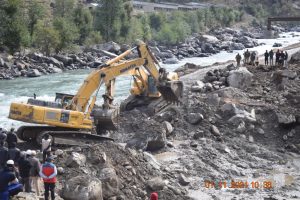In a significant move for both regional cooperation and climate resilience, a 40-member team comprising experts from India, Pakistan, and the World Bank arrived in the Kishtwar district of Jammu and Kashmir this week to inspect two hydroelectric projects. This visit, which took place under the framework of the Indus Water Treaty (IWT), holds immense importance not only for bilateral relations but also in the context of climate change and the imminent monsoon season in South Asia.
The delegation, which arrived in Jammu on Sunday and subsequently flew to Kishtwar in helicopters, marks the first visit by a Pakistani team to Jammu and Kashmir in over five years. Led by Syed Ali Murtaza, the secretary of water resources in Pakistan, and accompanied by Pakistan’s IWT Commissioner Syed Mohammed Mehar Ali Shah, the nine-member Pakistani team was joined by a 12-member Indian delegation.
The primary objective of this visit was to examine the power projects on the Chenab River, which fall under the IWT, a pact that has been pivotal in managing the shared water resources between India and Pakistan since its inception in 1960.
The significance of this visit is underscored by the fact that the last inspection by a Pakistani team occurred in January 2019. The ties between the two countries had soured following India’s abrogation of Jammu and Kashmir’s special status, making this visit a crucial step in reviving dialogue and cooperation under the treaty’s dispute settlement mechanism.
The Indus Water Treaty, signed after nine years of negotiations with the World Bank as a signatory, outlines a mechanism for cooperation and information exchange between India and Pakistan regarding the use of cross-border rivers. The treaty allocates the three western rivers – Indus, Jhelum, and Chenab – to Pakistan, and the eastern rivers – Ravi, Beas, and Sutlej – to India. While the Indus originates in Ladakh and flows into Pakistan, the Jhelum flows from Kashmir, and the Chenab originates in the Lahaul-Spiti district of Himachal Pradesh, passing through Jammu before entering Pakistan.
The current inspection focuses on the 85 MW Ratle hydroelectric power project at Drabshalla and the 1000 MW Pakal Dul hydroelectric project on the Marusudar River, a tributary of the Chenab. These projects have been subjects of contention, with Pakistan raising objections to their design features.
Initially, Pakistan sought a settlement through a “Neutral Expert” in 2016 but later opted for adjudication via a Court of Arbitration. India’s insistence on resolving the issue through Neutral Expert proceedings led to prolonged negotiations, culminating in the World Bank appointing both a Neutral Expert and the chair of the Court of Arbitration in October 2022.
The inspection of these hydroelectric projects is particularly significant in the context of ongoing climate changes and the upcoming monsoon season in South Asia. Climate change poses severe threats to the region, including altered precipitation patterns, increased frequency and intensity of extreme weather events, and glacier melt. These changes have profound implications for water resources management, making the sustainable and equitable utilization of shared rivers even more critical.
Hydropower projects, such as those on the Chenab River, offer a dual benefit in this scenario. They provide a renewable source of energy, reducing reliance on fossil fuels and thereby mitigating greenhouse gas emissions. Additionally, these projects can play a vital role in managing water flow, reducing the risk of floods during the monsoon season, and ensuring a steady water supply during dry periods.
However, the construction and operation of such projects must be carefully managed to avoid adverse environmental impacts. The joint inspection by teams from India and Pakistan, as well as World Bank experts, aims to address these concerns, ensuring that the projects adhere to international standards and do not disrupt the ecological balance of the region.
The visit also highlights the importance of regional cooperation in addressing the challenges posed by climate change. South Asia, home to over a billion people, is one of the most vulnerable regions to climate change impacts. Effective management of shared water resources through frameworks like the IWT is crucial for building resilience against these impacts.
The coordination efforts by the Jammu and Kashmir administration, which appointed 25 liaison officers each in Jammu and Srinagar to facilitate the visit of neutral experts and delegations from both countries, demonstrate the commitment to ensuring a smooth and productive inspection process. This level of cooperation is essential for fostering trust and collaboration between India and Pakistan, which can lead to more comprehensive strategies for managing the impacts of climate change.
As the team continues its inspection of the hydroelectric projects, the broader implications of their findings will be closely watched. The outcome of this visit could set a precedent for future cooperation under the IWT, encouraging both countries to prioritize sustainable water management and climate resilience.
The World Bank’s involvement as a neutral arbitrator further underscores the international community’s interest in ensuring that India and Pakistan manage their shared water resources effectively. The ruling by the Court of Arbitration in July 2023, which declared its competence to consider and determine the disputes raised by Pakistan, adds a layer of legal oversight that can help in resolving such issues amicably.
The examination of hydroelectric projects under the Indus Water Treaty by the India-Pakistan teams and World Bank experts is a significant step toward regional cooperation and climate resilience. As South Asia braces for the impacts of climate change and the upcoming monsoon season, the sustainable and equitable management of shared water resources becomes increasingly critical. This visit not only aims to resolve existing disputes but also sets the stage for future collaboration, ensuring that both India and Pakistan can harness their shared rivers for mutual benefit while safeguarding the environment.

































